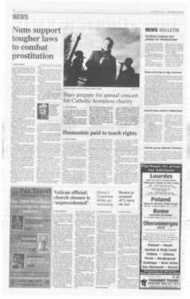Page 3, 28th November 2008
Page 3

Report an error
Noticed an error on this page?If you've noticed an error in this article please click here to report it.
Tags
Share
Related articles
Westminster’s New Archbishop Speaks Out
Archbishop: Banks Are Still Irresponsible
Archbishop Fears A Rupture Worse Than Reformation
Be Brave, Archbishop Tells Birmingham's Catholic Men
Why Britain Must Not Put Off The Day Of Reckoning
Archbishop blames financial crisis on lack of virtue
BY ANNA ARCO
CHRISTIAN FAITH will safeguard human virtues needed in the leaner times ahead, the Archbishop of Birmingham has said.
Archbishop Vincent Nichols addressed the global economic downturn last Sunday when he spoke about the need for a return to true virtue, which he said was safeguarded by the Christian faith.
He joined a number of prominent clerics, including the Pope, who have entered into discussion about the worsening financial climate.
Speaking at the Civic Mass in Birmingham's St Chad's Cathedral for the Feast of Christ the King,Archbishop Nichols blamed the world's financial woes on a lack of true virtue.
He said the fmancial market had "no robust external frame of reference" and that it lacked the "perspective and practice of true virtue".
He said: "Perhaps the same can be said of our society at large. We have neglected the development of shared ethical values and principles to guide and shape our behaviour, believing that to be an unattainable goal and we have substituted raft after raft of regu lation. Yet society controlled only by regulation succumbs sooner or later to our inherent drive for selfinterest. Society too needs the perspective and practice of true virtue."
The archbishop said "values" had taken the place of "virtue" in public discourse and ethical talk had been confined to the private sphere.
He said talk of virtue was more demanding because it required "dedication, sacrifice and true skill".
He said: "The Christian faith, as expressed in the readings which we have heard this morning, is a guardian of true human virtues. Traditionally a virtue is expressed as being 'personal capacity for action, the fruit of a series of good actions, a power for progress and perfection' ."
Listing the human virtues as prudence. courage, justice and temperance, he said that they were guarded by the Church and also "by other faiths and many of good will" and that the world needed the practice of these virtues at all times.
He said: "In times of plenty they promote generosity and philanthropy, good working practices in every enterprise and the service not just of one's own benefit but of the common good of all . In times of austerity they lead us to a simpler lifestyle, to a practical relief of material poverty, to a discovery of a sense of deeper shared identity and mutual concern, to wise practical judgements about what is of lasting importance and what simply the fruit of excess."
Archbishop Nichols's homily came as the Vatican called for a new international agreement on monitoring global financial operations.
The statement, drafted by the Pontifical Council for Justice and Peace, demanded that poorer countries have a say in economic policies, that abuses by offshore financial institutions, which many believe have contributed to the current gloomy financial outlook, should be curbed.
Solutions to the global financial crisis must not favour rich countries at the expense of the poor and that under the present economic system "poor countries are financing rich countries".
The statement said: "There is a need to avoid triggering a chain of mutual protectionism. Instead, cooperation should be strengthened regarding transparency and vigilance over the financial system. It is important that the political examination among the richest nations, although necessary, does not lead to solutions based on exclusive agreements."
Last week. Italy's Finance Minister Giulio Tremonti said that Pope Benedict XVI was the first to predict the global economic downturn in an article he wrote in 1985 on market economy and ethics, though this has been disputed. L'Osservatore Romano also criticised the free-market model on the same day.
Vatican Notebook: Page 4
blog comments powered by Disqus



















